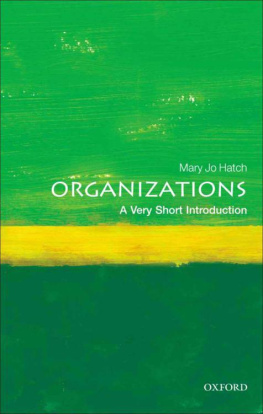Stefan Khl is professor of sociology at the University of Bielefeld in Germany and works as a consultant for Metaplan, a consulting firm based in Princeton, Hamburg, Shanghai, Singapore, Versailles and Zurich. He studied sociology and history at the University of Bielefeld (Germany), Johns Hopkins University in Baltimore (USA), Universit Paris-X-Nanterre (France) and the University of Oxford (UK).
Other Books by Stefan Khl
Organizations: A Systems Approach
(Routledge 2013)
Ordinary Organizations: Why Normal Men Carried Out the Holocaust
(Polity Press 2016)
When the Monkeys Run the Zoo: The Pitfalls of Flat Hierarchies
(forthcoming)
Sisyphus in Management: The Futile Search for the Optimal Organizational Structure
(forthcoming)
The Rainmaker Effect: Contradictions of the Learning Organization
(forthcoming)
To contact us:
Metaplan
101 Wall Street
Princeton, NJ 08540
USA
Phone: +1 609-688-9171
stefankuehl@metaplan.com
www.metaplan.com
Imprint
ISBN (Print) 978-0-9991479-4-8
ISBN (EPUB) 978-0-9991479-5-5
Copyright 2017 by Stefan Khl
All rights reserved. No part of this publication may be reproduced or transmitted in any form or by any means, without permission in writing from the author.
Translated by: Adam Blauhut
Cover Design: Guido Kltsch
Typesetting: Thomas Auer
Project Management: Tabea Koepp
www.organizationaldialoguepress.com
Foreword:
Market Exploration
Instead of Market Research
The title of this book, Exploring Markets, does not accurately reflect its content. The book focuses not only on how businesses view their product markets, labor markets and financial markets, but, more generally, on how different types of organizations perceive their environment and justify decisions on the basis of their perceptions. Even if market research approaches tend to reduce discussions about organizational alignment with a relevant section of the environment to businesses, we should not ignore the way other types of organizations observe their environment. After all, it is often more difficult for public administrations, armies, political parties, government departments, hospitals and universities to take in their complex environments than it is for companies.
The title Exploring Markets is likely to confuse many readers, since the verb to explore typically calls to mind groups of schoolchildren exploring the natural environment on an excursion or ten-month-old infants consciously registering their immediate environment for the first time. However, even though this book is concerned with how companies perceive their environment in general and thus moves beyond the exploration of markets, we decided to keep the title.
We have chosen the word exploring quite deliberately. The more common term, researching markets, stands for an approach that continues to dominate organizational practice today, one that assumes that an organizations environment can be determined objectively. The work performed at most market research institutes and departments is characterized by the idea that these institutes and departments can grasp market developments as they really are if only they collect data according to scientific standards of reliability, validity and representativeness. This notion reflects the instrumental-rational understanding of organizations that long dominated management circles in the past and is based on the assumption that organizations can derive the right strategiesi.e., the means to achieve a purpose or aimfrom a precise analysis of the environment and then construct an entire organization based on means-ends chains.
By using the term exploring markets, we signal that we reject the notion that markets can be investigated objectively. With the cognitive turn in organizational science, researchers came to recognize that an organizations structure plays a key role in determining its view of its environment. If different views exist within an organizationso goes the thinkingit has nothing to do with the fact that the single proper view has not yet established itself, but rather with the fact that the individual organizational units are integrated into the organizational structure in different ways and perceive their environment through individual observation grids.
The aim of this booklet is to show what form market exploration can take beyond this relatively narrow perspective. The first chapter illustrates how organizations observe their environments and to what extent they take their cue from other organizations in their organizational field. The second chapter explains why the long-dominant theory that organizations can objectively grasp their environment is insufficient. In contrast to this theory, we demonstrate that organizations construct their environment themselves. The third chapter offers a detailed description of how organizations can selectively change the way they perceive their environment through the techniques of de-generalization and hypothesis formation. Nevertheless, there is only one way to fundamentally change perceptions of the environment and that is to change organizational structure. The fourth chapterour summarybriefly discusses how this can be done.
I have written this book mainly for practitioners in companies, public administrations, hospitals, schools, armies, police departments, political parties and associations. When describing the approach, I draw on our many years of experience in helping companies, public administrations, universities, hospitals and non-profit organizations explore their environments. I constantly show in individual passages where the approach we promote incorporates elements from current market research practices and where it deviates from them.
Even though this book was written for real-world application based on real-world experience, our goal is to ensure that the reflections it introduces are aligned with modern approaches in organizational theory. Without disregarding the fundamentally different lines of thought and application contexts in organizational theory, on the one hand, and organizational practice, on the other, I aim to present a proven approach that does not immediately elicit a pitying smile from an organizational scientist because of its allegedly simplistic understanding of organizations. In a number of passagese.g. when developing the forming concept to explain an organizations perceptions of its environmentI even aspire to go beyond current research.
This book is part of a series in which we provide organizational practitioners with the essentials of a key management topic against the backdrop of modern organizational theory. In addition to this volume, Exploring Markets , we will also publish books on the topics of Designing Organizations , Influencing Organizational Culture, Developing Mission Statements , Managing Projects , Developing Strategies, and Lateral Leadership . These books can be read individually if practitioners wish to learn about a specific problem within their organizations. On the other hand, they have been conceived as a series to ensure that, when they are read, they produce a consistent, coherent view of the functionality of organizations and the options practitioners have to influence them. Because they have been cast from the same mold, attentive readers will constantly find related lines of thought and similar phrases in all the books. These overlaps are intentional and are included to emphasize the consistency of the underlying construct of ideas and the many links between the different guides.









